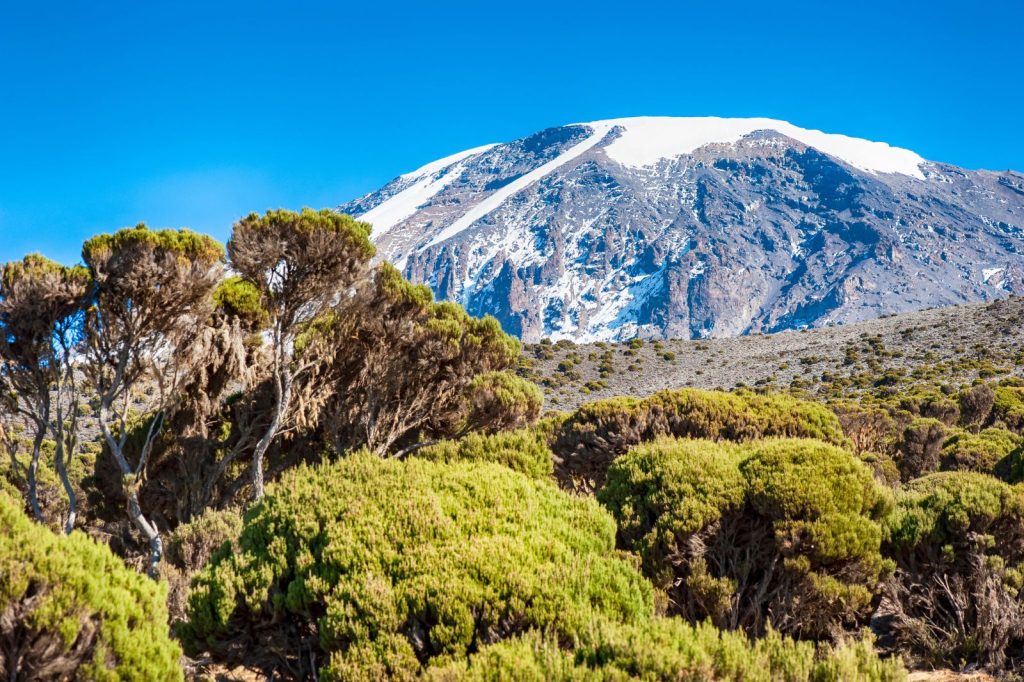
Mount Kilimanjaro, Africa’s tallest peak at 5,895 meters (19,341 ft), towers majestically above the Tanzanian plains. As the world’s tallest free-standing mountain, Kilimanjaro is more than a physical challenge—it’s a personal journey that rewards adventurers with breathtaking landscapes and the ultimate sense of achievement.
Trekking Kilimanjaro doesn’t require technical climbing skills, but it does demand preparation, endurance, and the right route. Choose from famous trails like the Marangu, Machame, Lemosho, or Northern Circuit, each offering a unique experience through rainforest, moorland, alpine desert, and glaciers to the summit—Uhuru Peak.
Kilimanjaro is not just a climb—it’s a life-changing experience.

A Natural Wonder Like No Other
Contrary to what many believe, climbing Kilimanjaro does not require technical mountaineering skills. It is a non-technical trek, meaning anyone in good physical condition, with mental determination and proper acclimatization, can summit. People from all walks of life—young adventurers, seasoned hikers, even 70+ year-olds—have reached Uhuru Peak, the summit of Kilimanjaro.
The most favourable times to climb Kilimanjaro are:
January to March (mild and less crowded)
June to October (dry season and popular for safaris too)
Avoid the long rainy seasons (April–May and November), which can make the trek more difficult.
Here are the most popular routes with a brief description:
Known as the “Coca-Cola Route”, it’s the only trail with hut accommodations and a steady ascent. It’s considered the most comfortable, but with a lower success rate due to shorter acclimatization time.
Nicknamed the “Whiskey Route”, it’s scenic and well-suited for physically fit trekkers. Great for acclimatization and one of the most popular trails.
A remote and scenic route with excellent acclimatization. It offers some of the highest success rates and is perfect for trekkers who want a quieter path.
The longest and most thorough route on the mountain. Ideal for climbers who want maximum acclimatization, low traffic, and sweeping views.
Approaches from the northern side, offering a drier and less crowded experience. Good for rainy seasons or off-the-beaten-path trekkers.
With Mama Africa Safaris, your climb includes:
Certified English-speaking mountain guides and crew
Quality tents, sleeping gear, and camp facilities
Nutritious meals and purified drinking water
Rescue services and emergency oxygen
Park fees, permits, and all logistics
We ensure safety, comfort, and support every step of the way.
Essentials include:
Light, breathable clothing (neutral colors)
Hat, sunglasses & sunscreen
Binoculars & camera
Insect repellent
Comfortable walking shoes
Warm layers for mornings/evenings
Summit night is both the most challenging and rewarding part of the trek. Typically starting around midnight, you’ll ascend under a blanket of stars to reach Uhuru Peak at sunrise. It’s a moment of triumph, emotion, and pure awe—a memory that lasts a lifetime.
After your climb, reward yourself with a Tanzania wildlife safari or a relaxing Zanzibar beach escape. Mama Africa Safaris can tailor-make your entire trip for the ultimate African adventure.
Let Mama Africa Safaris guide you safely and confidently to the summit of Mount Kilimanjaro. Choose your route, prepare your gear, and take the first step toward a life-changing journey.
Inspired by their stories? Let yours begin today. Whether it’s the Serengeti, the Mara, or gorilla trekking in Uganda, we’re here to make your dream African adventure a reality.
+255 767 319 976
info@mamaafricasafaris.co.tz
P.O. Box 16471. Kaloleni, Arusha, Tanzania.
Copyright © 2025 Mama Africa Safaris | All Rights Reserved